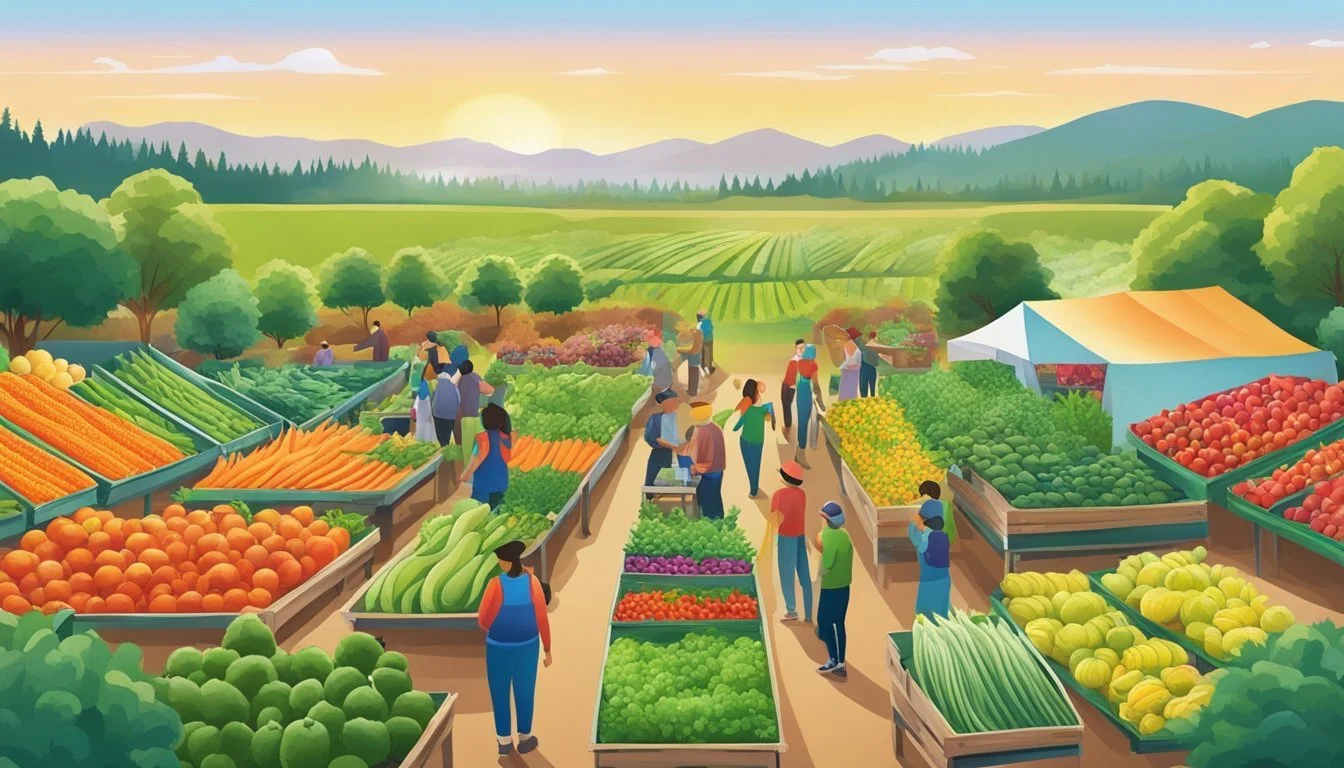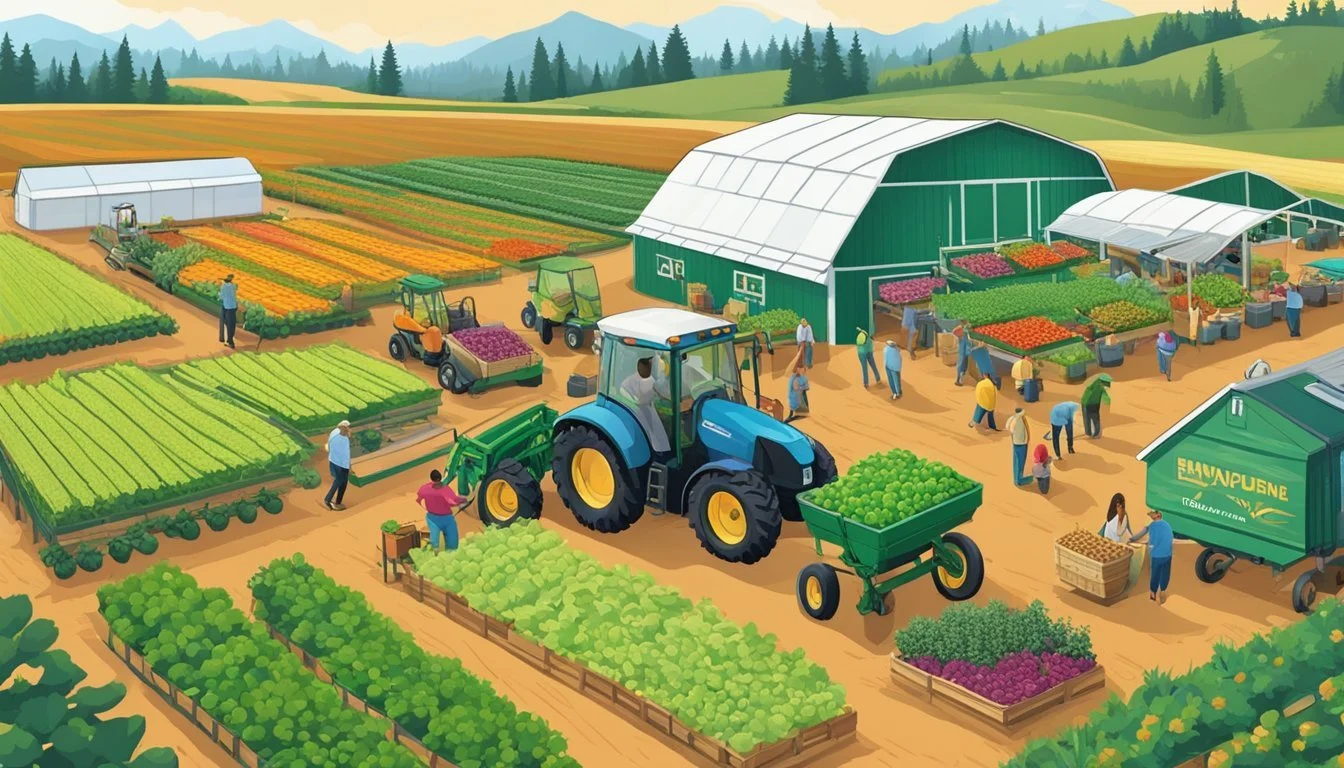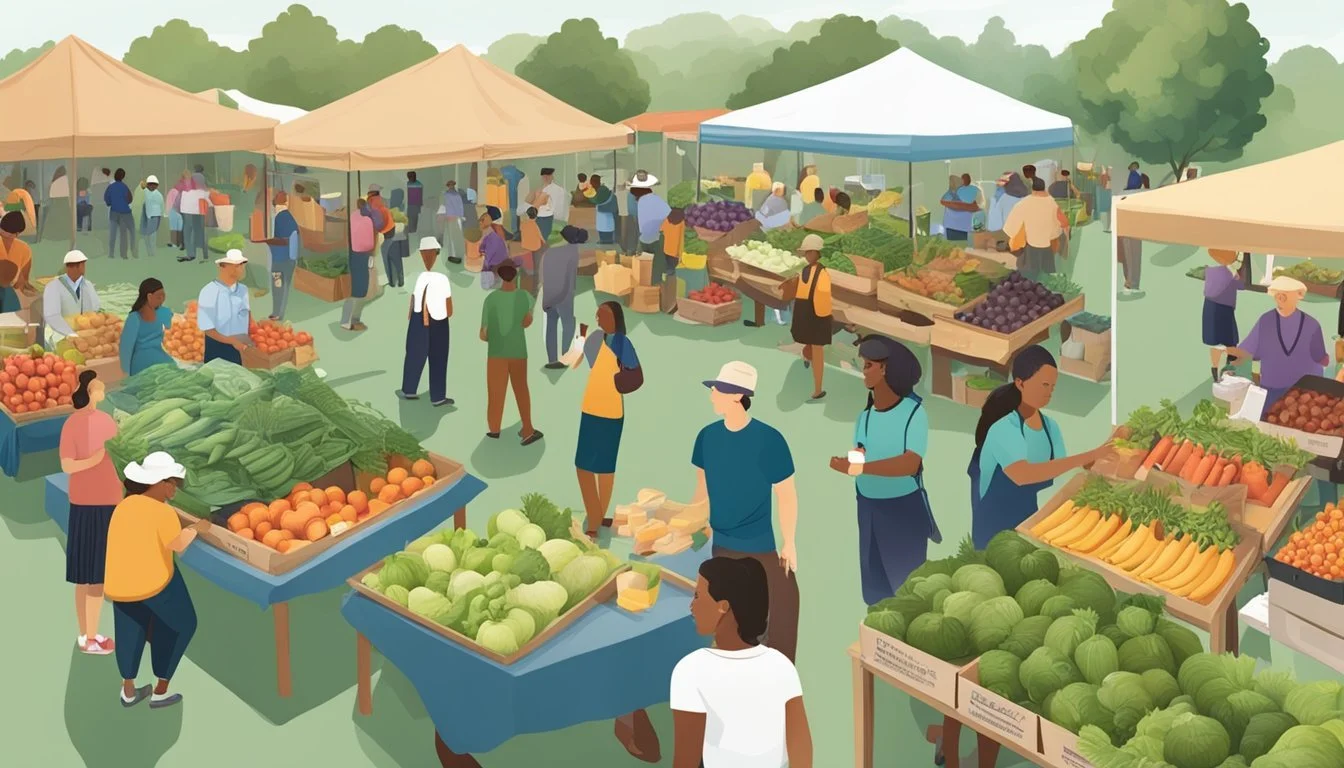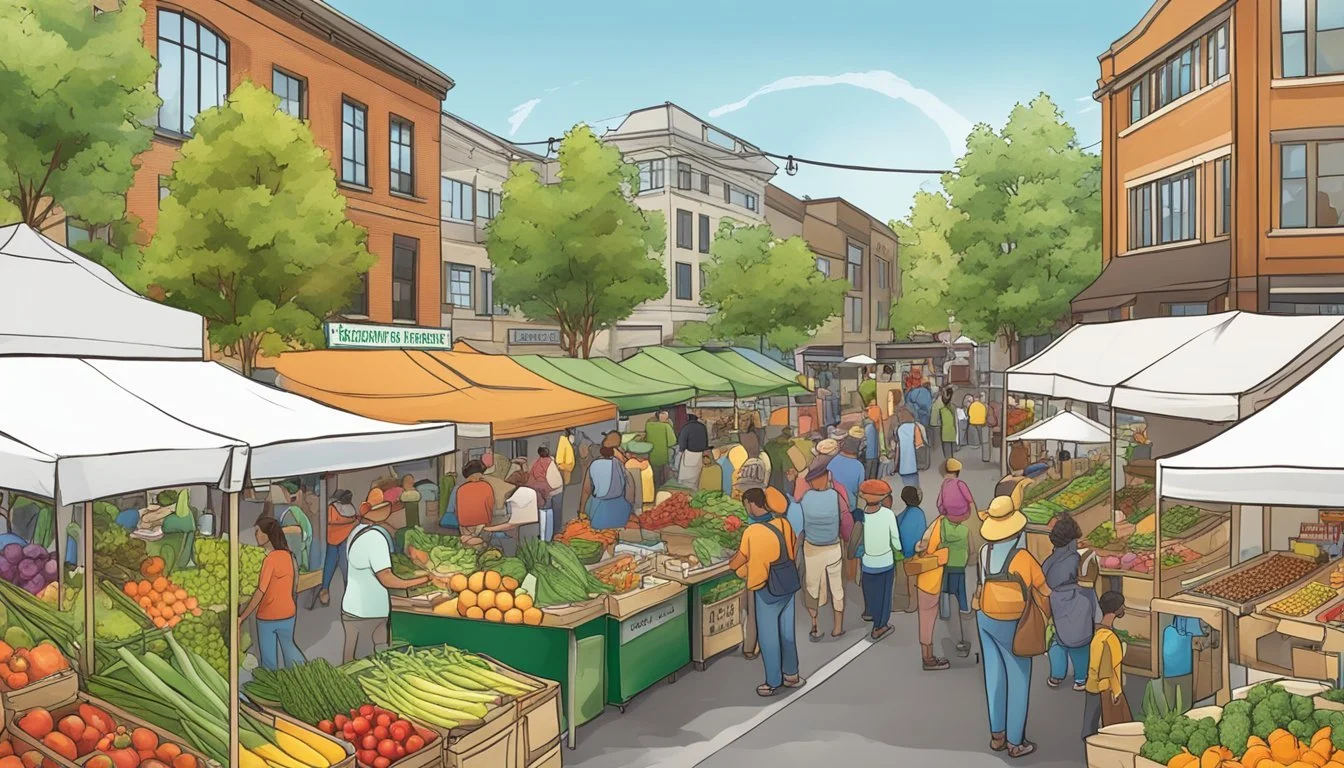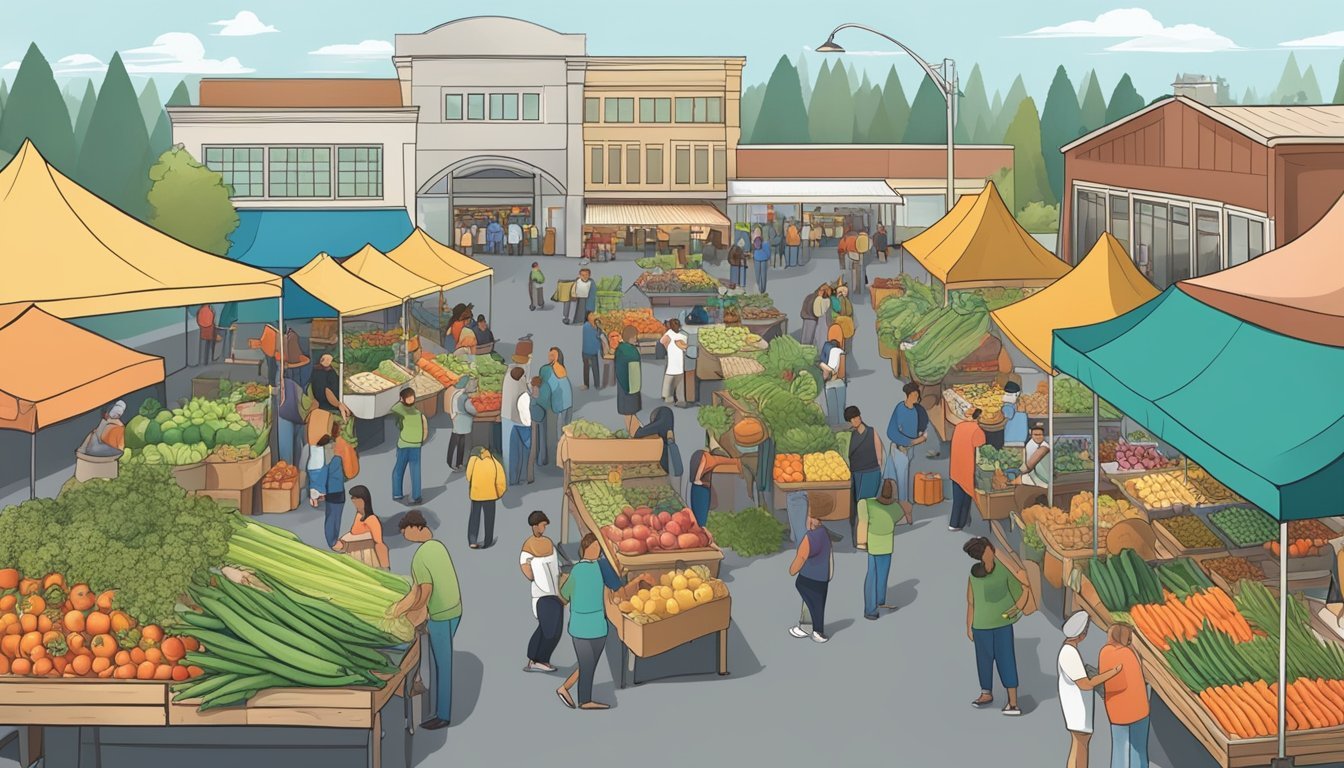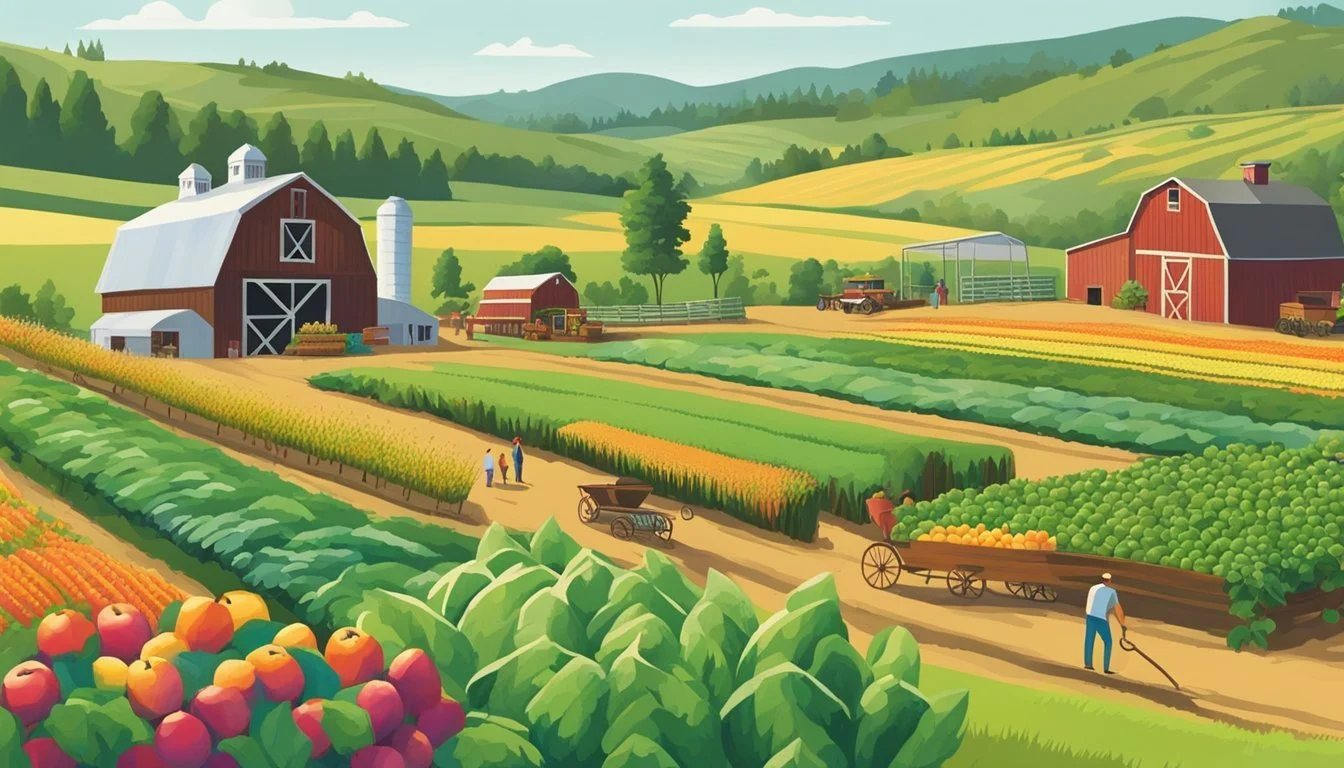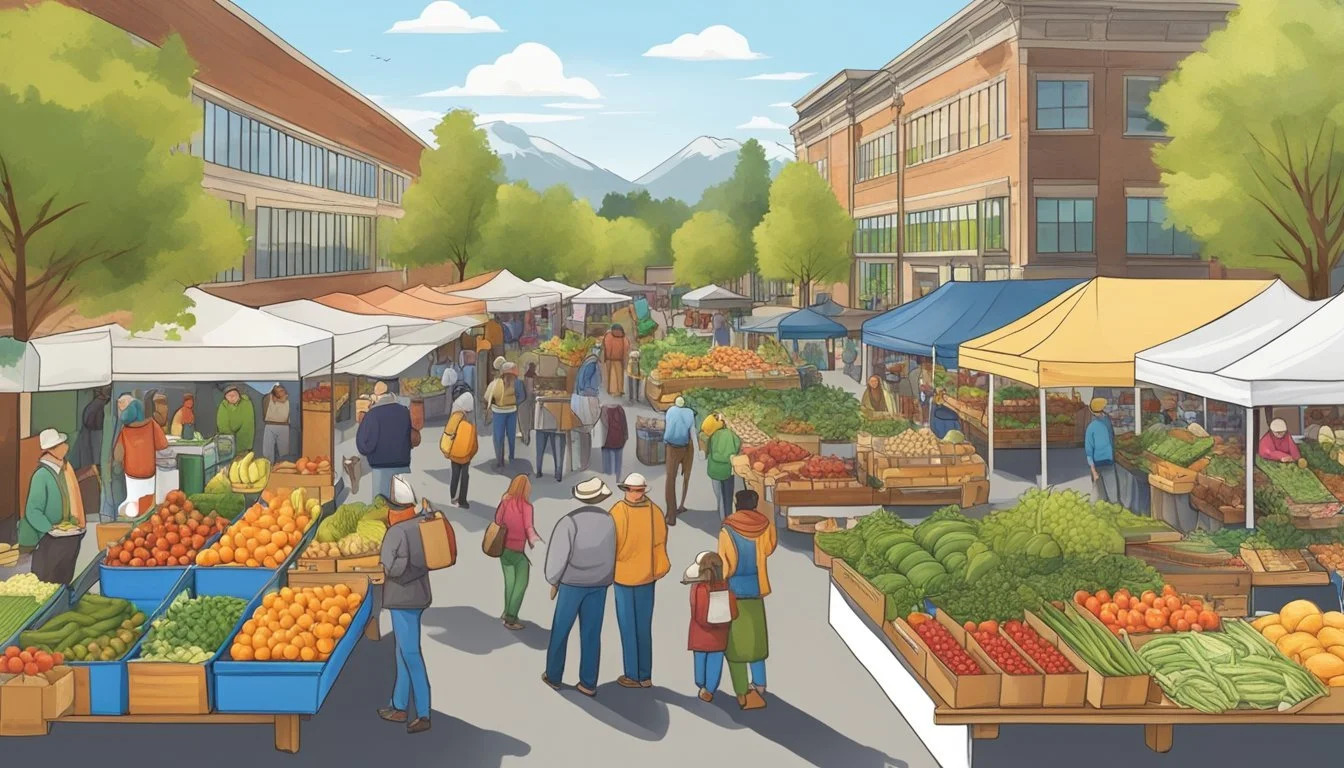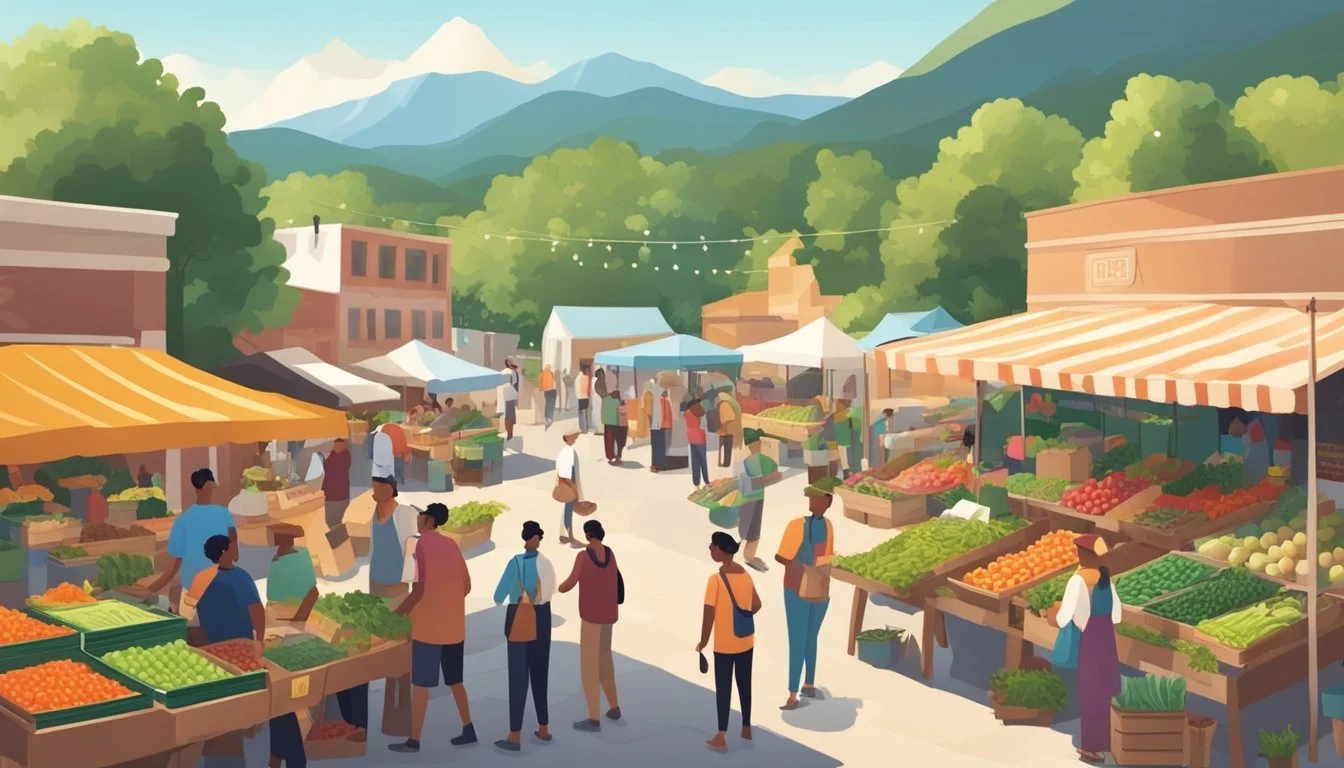Community Supported Agriculture (CSA) in Vancouver, WA
A Guide to Local Farm Shares
Community Supported Agriculture, or CSA, has taken root in Vancouver, Washington, offering residents a way to engage directly with local agriculture. It represents a partnership between consumers and producers, where members buy shares of a farm’s harvest in advance, providing farmers with anticipated revenue. In return, consumers receive regular deliveries of fresh, in-season produce, and occasionally additional farm products like eggs, herbs, and flowers. This model fosters a closer connection to the food source and supports local farmers, ensuring the growth and sustainability of local agriculture.
In Vancouver, WA, CSA programs are thriving due to the consumers' growing interest in understanding where and how their food is produced. Local CSAs offer a variety of share sizes, often providing monthly deliveries, flexible pickup options, and even on-farm events. The products available through these programs range from grass-finished beef and lamb, pastured pork and poultry, free-range eggs to local grains, and organic produce.
Participation in CSAs in Vancouver and the surrounding areas is an investment in community health and local economies. It enables consumers to have access to the freshest possible ingredients while supporting agricultural practices that are more likely to be sustainable and environmentally conscious. With a diverse range of CSA options available, residents of Vancouver can easily find a program that fits their culinary preferences and lifestyle, reinforcing the region’s commitment to local food resilience.
Understanding CSA
Community Supported Agriculture has become an integral part of local food distribution within Vancouver, WA, offering residents a direct connection to high-quality, fresh produce from their regional farms.
History of CSA in Vancouver
In Vancouver, WA, the CSA movement has mirrored the national trend, gaining momentum as consumers seek closer relationships with their food sources. It reflects a growing community interest in sustainable agricultural practices and a commitment to supporting local farmers. This model of agriculture allows consumers to share in the risks and rewards of farming by purchasing "shares" from local producers.
Principles of CSA
The principles of CSA are based on a direct, cooperative relationship between producers and consumers. Transparency, geographic proximity, and shared risk are key. Members typically pay for a season's worth of produce upfront, which contributes to the farm's operating budget. In return, they receive regular shares of the farm's harvest. This economic structure creates stability for the farmer and fosters a closer understanding of agriculture among consumers.
Key Principles include:
Support for Local Agriculture: Ensuring the survival and prosperity of local farming operations.
Community Engagement: Building relationships between growers and consumers.
Sustainability: Promoting agricultural practices that are environmentally sound and ethically responsible.
Shared Risk and Reward: Aligning consumer lifestyles with agricultural cycles.
Types of CSA Models
Various CSA models cater to different community needs and preferences. A typical CSA provides weekly deliveries of vegetables and fruits; however, others might offer meat, dairy products, eggs, and even flowers. Some CSAs may allow members to work on the farm in exchange for produce, enhancing the sense of community involvement.
Models of CSA:
Traditional Model: Members receive a weekly share of whatever is in season.
Market-Style CSA: Members have some choice in what they receive, often through a point system.
Meat CSAs: Focus on providing members with a variety of locally raised meats.
Grain CSAs: Supply members with locally grown grains and flours, which are less common but emerging.
CSA farms may also differ in scale and share distribution methods, from on-farm pickups to delivery services reaching neighboring regions like Portland and Bend, Oregon.
Benefits of Joining a CSA
Joining a Community Supported Agriculture (CSA) program in Vancouver, WA, offers individuals and families a range of tangible benefits. This section will explore how CSAs influence health, provide access to local food, benefit the environment, and strengthen community ties while offering financial advantages to both consumers and producers.
Fresh and Local Produce
CSAs guarantee that members receive a diverse array of seasonal produce that is picked at peak ripeness. This ensures not only enhanced flavor but also the highest possible nutrient content. Vancouver's CSA programs prioritize freshness, with most fruits and vegetables going from farm to table within 24 hours.
Health and Nutrition
The produce offered through CSAs tends to lack the high levels of pesticides and preservatives found in conventionally grown supermarket fare. Members typically report improvements in their diet, as they consume more fruits and vegetables, leading to a healthier lifestyle and better overall nutrition.
Environmental Impact
Local CSAs support sustainable farming practices that minimize the carbon footprint associated with long-distance transportation of food. They also often employ organic methods, reducing the amount of chemicals released into the environment. By participating in a CSA, members contribute to a healthier planet.
Community Connection
Members feel a sense of belonging and partnership with their local farmers. This translates to a more intimate understanding of where their food comes from and fosters relationships based on mutual support. Furthermore, CSAs often host community events, bridging the gap between urban residents and the agricultural process.
Economic Advantages
Subscribing to a CSA offers economic benefits such as:
Cost Savings: Buying directly from the source often results in lower costs compared to retail pricing.
Upfront Payment: Farmers receive funds ahead of the season to cover initial production costs, stabilizing the farm's finances.
Reduced Waste: With precise harvest amounts and knowing where the food is going, CSAs can cut down on overproduction and food waste.
CSA Farm Profiles
Community Supported Agriculture (CSA) connects consumers directly with farms, providing a mechanism to buy local, seasonal food directly from the producer. In Vancouver, WA, several farms offer CSA programs that contribute to the local food system and community health.
Dilish Farm
Dilish Farm specializes in a variety of fresh produce with a focus on sustainable farming practices. They offer CSA membership that allows consumers to experience the season's best produce harvested at its peak of freshness and flavor.
April Joy Farm
At April Joy Farm, customers can subscribe to a CSA that is dedicated to organic farming methods. The farm is certified organic and provides an array of vegetables, fruits, and sometimes includes farm-fresh eggs.
Slice of Heaven Gardens
Slice of Heaven Gardens takes pride in their diverse range of vegetables and herbs. They emphasize natural growing practices and offer CSA shares that often come with recipe suggestions allowing members to explore new flavors and dishes.
Sole Food Street Farms
Sole Food Street Farms operates as an urban agricultural project transforming vacant city land into vibrant farms. Their CSA program offers an urban twist providing fresh, local, and organic produce right from the heart of Vancouver.
Pemberton Market Garden
Pemberton Market Garden has a commitment to community wellbeing and sustainable agriculture. Their CSA boxes feature a wide array of seasonal produce, offering members a taste of the local bounty and supporting the local agricultural community.
Working with CSAs
Community Supported Agriculture in Vancouver, WA, provides a direct line between local farms and consumers. Members participate by purchasing a subscription, thus sharing in the seasonal harvest and supporting local agriculture.
Membership and Subscription Process
To participate in a CSA, customers typically purchase a membership either through a one-time payment or a series of installments. For example, buying a CSF (Community Supported Fishery) Member's Card for a set amount grants the member access to a range of products at discounted prices. Generally, these memberships can be bought online or at local markets.
Initial Purchase: A membership may cost around $300, granting equivalent credit towards products.
Discounts: Members might receive perks, such as 10% off fresh seasonal seafood and weekly selected items.
Seasonal Availability and Produce Offerings
Members receive a variety of products that change with the seasons. For instance, a typical CSA in Vancouver might offer grass-finished beef, lamb, pastured pork, poultry, and free-range eggs. Produce offerings are not limited to meats and often include:
Spring to Fall: Fresh herbs, vegetables, flowers, and eggs.
Year-Round: Frozen, smoked, or canned products.
Local farms provide detailed listings of available produce and meats, which help members know what to expect throughout the year.
Pickup and Distribution Logistics
CSAs in Vancouver have structured pickup and distribution systems. Members usually collect their share of the bounty at predetermined pickup locations such as the Vancouver Farmer’s Markets. Some CSAs offer monthly deliveries to specified areas.
Pickup Points: Often local farmer's markets or farms themselves.
Delivery: Available for certain CSAs with options such as monthly deliveries to Portland and Bend.
Members are encouraged to check with their chosen CSA for specific pickup times and locations, which are designed to ensure freshness and convenience.
Community Involvement and Education
Community Supported Agriculture (CSA) in Vancouver fosters a strong bond between consumers and producers, facilitating an array of activities focused on education and community engagement.
Volunteer Opportunities
In Vancouver, residents have opportunities to engage directly with local CSAs, contributing their time and labor. These initiatives can range from assisting with planting or harvesting to participating in community events. Volunteers gain hands-on experience in sustainable farming practices, playing an integral role in the local food system.
Workshops and Farm Tours
Local farms frequently offer educational workshops aimed at teaching participants about organic farming, seasonal planting, and food preservation. Farm tours enable visitors to witness the operations of a CSA firsthand, offering insights into the day-to-day challenges and successes of local agriculture. These experiences serve to connect consumers with the origins of their food and the importance of sustainable practices.
School and Youth Programs
CSAs in Vancouver emphasize the importance of integrating agriculture into education by hosting programs for students and youth groups. These programs may include field trips to farms and interactive activities that teach children about where their food comes from. By engaging with young people, these farms hope to instill an appreciation for local agriculture and the environment from an early age.
Sustainable Practices
Community Supported Agriculture in Vancouver, WA, demonstrates a strong commitment to sustainable agriculture, focusing on certified organic practices, soil health, and local ecosystems. Below is a detailed exploration of the comprehensive measures that ensure the environmental sustainability of CSAs in the region.
Organic Certification and Practices
CSAs in Vancouver place a significant emphasis on certified organic methods. By adhering to stringent organic standards, these farms avoid the use of synthetic pesticides and fertilizers, ensuring that the produce is grown in a way that is considered safer for both consumers and the environment. Hood River Organic, for instance, is a local farm that integrates sustainable organic practices to cultivate a variety of fruits and vegetables.
Soil Health and Crop Rotation
A critical component of sustainable agriculture is the maintenance of soil health. Many CSAs implement crop rotation and other soil enrichment strategies to prevent resource depletion. This approach not only maintains the fertility of the soil but also supports the production of a diverse range of local produce. Regularly alternating crops and employing natural compost applications are standard practices that benefit both the soil and the yields.
Supporting Local Ecosystems
Supporting Vancouver's CSAs contributes to the preservation of local ecosystems. Farms engaged in CSA practices often maintain undisturbed natural areas like woodlands and wetlands, which helps in preserving local biodiversity and wildlife habitats. With a focus on sustainable agriculture, these farms aim to maintain a balance between food production and ecosystem health.
Products and Produce
In Vancouver, WA, Community Supported Agriculture (CSA) programs offer a diverse selection of locally sourced products, from fresh produce to meats and specialty items.
Vegetable and Fruit Selection
CSA programs in Vancouver provide a vibrant assortment of vegetables and fruits. Subscribers can expect an array of organic vegetables such as mixed greens, leafy greens, and salad greens. The selection extends to fruit, which often includes seasonal berries and stone fruits. These fresh items are harvested close to delivery times to ensure peak ripeness and flavor.
Meat, Eggs, and Dairy
Local CSAs not only supply plant-based produce but also provide meat, eggs, and dairy products from animals raised on pasture. Members receive products such as grass-finished beef and lamb, as well as pastured pork and poultry. Free-range eggs are commonly included, which are known for their richness and higher nutritional content.
Herbs, Flowers, and Specialty Crops
Beyond standard produce, CSAs offer an array of herbs and flowers, enhancing both culinary endeavors and home aesthetics. Specialty crops may include mushrooms, microgreens, and raw Icelandic wool, diversifying the offerings available to CSA members. These items are not only fresh but also provide a connection to the local agriculture and landscape.
Challenges and Considerations
Engaging with Community Supported Agriculture (CSA) in Vancouver, WA, comes with a set of challenges and considerations that potential members and farmers need to keep in mind. These range from the impact of weather patterns to the dynamics of local economic factors and the degree of community involvement necessary for a CSA to thrive.
Weather and Seasonal Variations
CSAs in Vancouver face the challenge of dealing with diverse weather conditions which can affect the range and quality of seasonal produce. During certain times of the year, unexpected weather events can lead to a reduced harvest, affecting the variety and quantity of produce available to CSA members.
Spring: Cool and wet conditions can delay planting and the growth of certain crops.
Summer: While warmer temperatures can benefit some crops, the risk of drought can affect water-intensive produce.
Fall: Early frost can threaten late-season crops and reduce the overall yield.
Winter: Harsh conditions can limit the availability of fresh produce, necessitating the inclusion of preserved items.
Economic Factors
Sustainability of CSAs is closely tied to economic factors. The cost of maintaining a farm, fluctuating market prices for goods, and the purchasing power of the community all play critical roles. Farmers need to strike a balance between the cost of production and accessible pricing for CSA members.
Production Costs: High-quality, sustainable farming often requires investment in organic materials and labor.
Market Prices: Competing with supermarket prices can be a challenge for small CSA farms.
Membership Cost: Setting a price point that covers costs while remaining attractive to consumers requires careful calculation.
Community Support and Engagement
The success of a CSA critically depends on the level of support and engagement from the community. A strong network of members who are committed to the CSA model is necessary for its viability.
Volunteering: Some CSAs offer or require volunteer time from their members, which can affect community participation.
Member Commitment: Continuous education on the CSA model and its benefits helps maintain and grow membership.
Outreach: Active communication strategies are important for attracting new members and retaining existing ones.
Addressing these challenges and considerations is essential for the harmonious operation and long-term success of CSAs in Vancouver, WA.
Beyond the Box
Subscribing to a Community Supported Agriculture (CSA) program in Vancouver, WA, provides more than just a box of fresh produce. Members often gain access to a wealth of knowledge that can enhance their relationship with the contents of their weekly shares.
Recipes and Cooking Tips
Each CSA box is a new culinary adventure, often accompanied by recipes specifically designed for the week's harvest. CSA providers often include cooking tips to help members discover new ways to enjoy their fresh produce. These resources make it easy to integrate healthful, local food into daily meals.
Seasonal Recipes: Tailored to what is currently harvested, ensuring freshness and flavor.
Cooking Techniques: Covering everything from roasting to raw salads, highlighting the best methods for each type of produce.
Food Preservation Methods
CSA memberships encourage exploring food preservation methods to extend the enjoyment of seasonal produce. Members can receive guidance on:
Canning: Safe practices for preserving fruits and vegetables.
Freezing: Techniques for avoiding freezer burn and maintaining nutritional quality.
Drying: Instructions for creating dried fruits, herbs, and veggies for long-term storage.
These practices support a sustainable lifestyle and ensure that none of the produce goes to waste, reinforcing the value of their local food investment.
Engaging with the Local Food Scene
CSA memberships are gateways to deeper engagement with Vancouver's local food scene. Participation in a CSA is an opportunity to:
Visit farms: Some farms host events or offer pick-up options that allow members to see where their food comes from.
Meet farmers: Engage directly with those who grow the food, gaining insight into local agriculture practices and challenges.
Join food communities: CSAs are often linked to a broader community of individuals who value health and sustainability, sparking connections and conversations.
Through these interactions, members can appreciate the impact of their support for local farmers and the health benefits of consuming locally-grown food.
Economic Impact and Market Trends
Community Supported Agriculture (CSA) in Vancouver, WA has distinct economic implications and is subject to evolving market trends. CSA models affect farmers' earnings differently from other markets and have potential for growth amidst changing consumer demands.
CSA vs Farmers Markets
CSA arrangements offer steady income for farmers by securing funds before the season begins, contrasting the variable income from farmers markets where sales are more unpredictable. Customers at farmers markets have the advantage of selecting from a vast array of seasonal produce, yet CSA subscribers commit to a whole season of farm yield, which arguably strengthens the financial stability of local agriculture.
Wholesale and Retail Opportunities
While retail sales through CSA shares provide farmers with a fair price by eliminating intermediaries, wholesale channels often command larger volume sales albeit at lower price points. Direct-to-consumer models like CSA limit the capacity for wholesale due to the prioritization of member shares, but they can scale up production during peak season to explore additional retail opportunities at local markets.
Future Outlook for CSAs
CSAs in Vancouver are likely to thrive on consumer interest in sustainability and local food systems. The inclination towards farm-to-table experiences could influence more significant production of varied seasonal produce, positing CSAs as a critical player in the local food economy. The growth trajectory for CSAs appears poised for expansion, considering the supportive market trends towards conscious consumerism.
Extending the CSA Concept
Building on the traditional CSA model, Vancouver is seeing a diversification in the types of products and partnerships that embrace the community-supported model, ensuring a wider range of local products are available directly from the producers.
Community Supported Fisheries (CSFs)
Vancouver's proximity to the Pacific Ocean and the Fraser River positions it perfectly for Community Supported Fisheries. CSFs operate similarly to traditional CSAs but focus on seafood. Seafood enthusiasts in Vancouver can subscribe to receive a regular share of local, seasonally caught seafood from places like Richmond and the Westham Island area. This not only supports the local fishers but also encourages sustainable fishing practices.
Urban Farming Initiatives
Fresh Roots Urban Farm and Glorious Organics Co-op lead the way in urban agriculture, a concept that expands the CSA model into the urban environment. They cultivate underutilized spaces within Vancouver and in nearby areas like Aldergrove. Urban farming initiatives often offer CSA-style boxes filled with fresh, organically grown produce, and also provide educational programs on urban agriculture and food security.
Agricultural Co-Ops and Partnerships
The region near Vancouver, including Chilliwack, has seen a rise in agricultural cooperatives and partnerships that operate on the CSA model but extend beyond individual farms. These co-ops offer shares in a variety of products, such as locally grown grains from Cedar Isle Farm, bringing together farmers and consumers to bolster the local food economy. By working in partnerships, producers can offer a more diverse range of products, mitigating risk and strengthening community resilience.
Conclusion
Community Supported Agriculture (CSA) has established a significant presence in Vancouver, WA. These programs, leveraging a direct-to-consumer model, foster a partnership between residents and local farms. Customers often purchase shares from area CSAs, which in turn provide them with a portion of the harvest throughout the growing season.
The benefits of participating in a CSA program in the Vancouver area include:
Local Sourcing: Food is grown and harvested within the region.
Freshness: Produce delivered to consumers is known for its quality and taste.
Support for Farmers: Pre-season funding aids in the farm's financial planning.
Community Building: CSAs often promote a sense of connection among members and with the farmers.
Participants can choose from various local CSA options in Vancouver, including those that offer organic produce like Hood River Organic, those with unique offerings such as raw Icelandic wool, and farms that integrate community events as part of the CSA experience.
Local CSAs are not only a means to obtain fresh produce; they also play a pivotal role in bolstering sustainable agriculture, contributing to ecological and community resilience. The structure of these agricultural programs provides customers with a transparent understanding of where their food comes from and the opportunity to engage more deeply with the process of food production.

